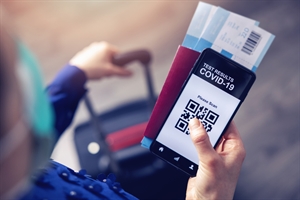Covid-19 omicron variant is causing concern within the travel industry. But with a few simple changes to your travel routine you can reduce your risk of exposure to this highly infectious virus.
Get tested before you travel
The number one thing you can do to protect others from the omicron variant of covid-19 is to get tested before you fly. You will need to show a negative covid-19 test result to board your flight, and it is likely that this will be a condition of entry at your destination, too.
A reliable testing service for covid-19
To make sure you are not turned away at the airport or at the border, use a reliable testing service that delivers results and travel health certificates promptly.
Global Travel Clinics provides:
- PCR swab tests with 24-hour results
- Antigen testing with results in three to four hours (only valid for some destinations)
There are many branches of Global Travel Clinics so there is sure to be a site where you can get covid-19 RT PCR testing nearby. Book online right now. A test takes just minutes, and you can rely on us to deliver your covid-19 test results in time for your journey.
We have seen very rapid changes to travel rules and requirements for entry into countries. So make frequent checks of travel advisories from a reliable source, such as government websites, to ensure you are not delayed on your journey.
Check the advice while planning your trip, before booking your covid-19 test and again immediately before departure.
Can I avoid omicron on my flight?
The omicron variant of covid-19 is very infectious, and there is a risk that you might be exposed to it on your flight. Your airline will have specific guidance that you should follow during your flight. You may be asked to:
- wearing a mask
- clean your hands frequently
- avoid touching your face
- These steps will all help reduce your risk of exposure to covid-19 omicron variant while you travel.
If you feel ill, do not fly
If you have symptoms of a respiratory illness that are associated with covid-19, such as a cough, fever, sore throat or runny nose, cancel your travel plans. This will protect others from infection and reduce the transmission of covid-19. The Centers for Disease Control and Prevention have advice on recognizing the symptoms that might be covid-19.
What is the best way to avoid exposure to covid-19 at the airport?
Familiarize yourself with the airport’s own guidance before arrival. It is likely to include advice to help reduce your exposure to covid-19 at the airport such as:
- minimize waiting around time
- maintain social distancing where you can
- wear a mask (unless exempt)
- sanitize your hands frequently with alcohol handrub or soap and water particularly after touching shared surfaces
How can I protect myself from covid-19 during my flight?
Your flight crew will ask you to follow the airline’s covid-19 guidance during your flight. This may include:
- wear a mask
- clean your hands
- stay in your seat
Expect limited food and drink on your flight, and be prepared to use a contactless payment method.
What if I become ill on my flight?
If you feel unwell during your flight, inform one of the flight attendants.
Where can I get travel health advice about flying safely?
We have an article on flight health that covers topics such as deep vein thrombosis, jet lag and dehydration. Your airline’s website may also have some health tips for you.


Book Online